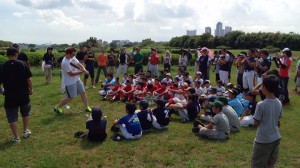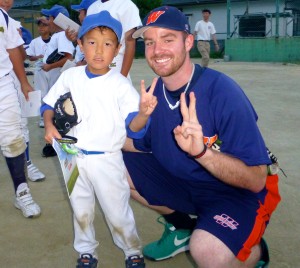Millions of people spend their whole life trying to find one true purpose for which they’ve been placed on this planet. And then there are folks like Will Thompson.
Thompson grew up in a Christian home and attended church regularly. He accepted Christ as his Savior at the age of five. Even then, he had a heart to share his faith with friends.
But the first inkling of his future came when Thompson moved to Japan where his father worked for IBM. It didn’t take long for him to catch a vision and begin to imagine what life would be like sharing the Gospel with the Japanese people.
“Those five years in Japan completely changed our family,” Thompson says. “Being there as a young kid completely changed my life.”
Not only did Thompson know what he wanted to do later in life, he knew exactly how he wanted to do it. Just behind his love for Jesus and his love for his family was a growing passion for the game of baseball. Thompson was the only foreigner in his local youth league and that connection drew him even closer to the Japanese culture. So it made perfect sense for the burgeoning athlete to pursue a professional career that would afford him a platform from which he could share the Gospel.

Professional Japanese baseball player Matt Murton teaching hitting at a baseball outreach clinic in Tokyo.
Thompson’s dream came half true. After his family moved back to Georgia, he did his best to stay refreshed on how to speak the language. Thompson even attended a Japanese church on occasion and connected with the Japanese community in Atlanta and Chicago while in high school and college. He traveled back to Japan for mission trips and found that the fire was still burning hot for one of the most unreached people groups in the industrialized world.
It was during the summer of 2010, just before his senior year, when Thompson realized the dream of playing professionally wasn’t going to be part of God’s plan.
“I always had a heart to do ministry in Japan,” he explains. “I thought the best way to go about doing that was to be the one with the platform. While I was on a mission trip to the Dominican Republic with the baseball team at Wheaton College in 2010, I remember God spoke to my heart and told me I needed to let go of that dream. So in that moment, I told Him to take my life and do with it whatever He wanted. From then on, He started showing me all the things He could do with my life. Since then, He’s given me all sorts of cool opportunities and divine connections.”
Among those connections, his relationship with FCA’s Dominican Republic national director Mike Shaheen has been one of the most important. Although Thompson was in the Dominican Republic on an internship with S.C.O.R.E. International after finishing college in 2011, it was his introduction to FCA’s work there that opened his eyes to what was possible in Japan. He officially joined FCA in December of 2011, after further learning from Shaheen about the ministry, and completed his training in January of 2012. By May, Thompson had raised his funding and moved to Japan, where a year earlier the infamous earthquake and tsunami had devastated the Pacific coast of Tohoku. He spent three months doing relief work while working on a game plan for the launch of FCA Japan.
It didn’t take long for Thompson to experience a revelation. First of all, ministry would need to center around the country’s most popular sport—baseball. Although sumo wrestling, golf and soccer are also well-liked amongst the general population, teams like the Yomiuri Giants and Hanshin Tigers, and athletes like Sadaharu Oh, Isao Harimoto and Major League Baseball stars Ichiro Suzuki and Hideki Matsui have created an unrivaled rabid fan base.

Matt Murton Rice Donation Project in the tsunami-devastated region of Tohoku for survivors in temporary housing.
But for this to work, Thompson would then need to make in-roads to the baseball community. Enter Matt Murton, an American player who spent four years as a reserve outfielder with the Cubs, A’s and Rockies’ organizations, before signing to play with the Hanshin Tigers in the Nippon Professional Baseball (NPB) league.
Thompson met Murton through a mutual friend, FCA Atlanta Director of Coaches Ministry Sid Callaway, and the two quickly saw significant ministry potential. Murton was already riding high after breaking Ichiro’s single season hits record (214 hits in 144 games) in his first season in Japan. He used the newfound fame to spearhead a rice donation project in which he donated 50 kilograms of rice, along with a testimony card and wristband, to the tsunami survivors for every one of his team’s wins.
In 2013, Thompson and Murton visited a juvenile detention center in Okinawa where Murton was allowed to share his testimony despite countless missionaries and pastors being denied the same access. In the past three years, Thompson and Murton have also staged numerous clinics throughout Japan and ministered to homeless people in the Osaka area.
“It has been amazing to see Will partner with nationally known baseball stars to increase FCA’s platform,” Executive Vice President of International Ministry Dan Britton says. “He has a heart for missions and a deep love for the country of Japan. God is using him greatly.”
While Murton has helped open doors, ministry in Japan remains a difficult proposition. Less than 0.5% of the population is Christian and Japanese are culturally resistant to new things. This is just one of many reasons why Japan has become known as “the graveyard for missionaries.”
“Japan is the most deeply rooted culture in the world, in my opinion” Thompson says. “They’ve spent hundreds of years by themselves on an island, secluded from the rest of the world. Just living everyday life here as a foreigner, your presence often makes them uncomfortable. You can’t get away with doing ministry or FCA like you do in the United States. You have to do things differently. You have to earn the right to be heard.”

Thompson's time as a volunteer, playing catch with kids who survived the tsunami.
Such was the case with one of Thompson’s first Japanese sports ministry friends—a trainer named Taka. After meeting on Facebook through a mutual friend, the two went to a baseball game together and had coffee afterwards. The conversation opened Thompson’s eyes to the Japanese mindset as it pertains to religion.
“Are you here to convert people to your religion?” Taka asked.
The blunt question took Thompson by surprise. He paused for a moment and silently asked the Holy Spirit to give him a wise response.
“No, I’m not here to convert people to my religion,” Thompson replied. “I’m here because Jesus has changed my life and I want to share that with the Japanese people.”
That was an answer that Taka could respect.
“From then on, I never shoved a tract in his hand,” Thompson continues. “I never tried to twist his arm and try to get him to come to church. I just hung out with him. I just loved him. We went to games together. We played on baseball teams together. We became close friends. In the process, he started coming to church with me. His heart opened and now he’s a follower of Jesus.”
Taka is one of several sports trainers that Thompson is discipling and adding to the FCA Japan team. Unlike American and European culture, coaches are often considered unapproachable; therefore, the trainers can wield great relational influence. Those relationships are helping Thompson move forward despite initial concern from the Christian church in Japan where sports has been seen as direct competition.
“Serious athletes in Japan have to play on Sundays,” Thompson says. “Kids growing up in church are often told they have to choose one or the other. It’s a big issue in Japan where many pastors are uncomfortable with sports ministry. But the platform of the pro guys like Matt helps open the doors to churches. Ultimately, I want to go through the sports guys and invite the churches to come along. Pastors are going to have to see it before they’re going to believe it.”
In one instance, the Asian division of the Billy Graham Evangelistic Association hosted an event in Southern Japan with Billy Graham’s grandson Will Graham. Thompson helped coordinate a slot on the lineup for Jason Standridge, another American playing baseball overseas. Although the pastors on the committee resisted the addition, Standridge turned out to be the biggest draw. The pastors quickly recognized the athlete’s popularity and began inviting him to their churches.
“When it clicks, Japanese believers are the most passionate, loyal believers in the world,” Thompson says.

Thompson with a young participant at a baseball outreach clinic in Ishinomaki, a town in the northeast that was devastated by the tsunami.
Moving forward, Thompson hopes to see leaders raised up in every Japanese prefecture (or province) and have every major sport covered. He sees the upcoming 2020 Tokyo Olympics as “a gift from God” and is already helping put together a group of community and church leaders to use the Summer Games as a mechanism for sharing the Gospel to all sports fans throughout the nation.
But no matter what the platform, program or process involved, Thompson knows that sports ministry in Japan will always be as unique as its culturally engrained people.
“I don’t want to export the Western concept of Christianity to Japan, but I want to show the Japanese who Jesus is and find out how we can lift up the name of Jesus through sports,” he says. “From there, I want to let Him take care of the hearts of the Japanese and raise up followers of Christ here, disciples who are uniquely Japanese. Now is the time for sports ministry in Japan. The harvest is plentiful and ripe.”
Originally published September 2014
Five Facts About Japan
1. Japan is made up of 6,852 islands in the Pacific Ocean. The four largest are Honshu, Hokkaido, Kyushu, and Shikoku. The first known habitants of a Japanese island began settling there around 30,000 BC.
2. With over 126 million people, Japan is the 10th largest population in the world. The capital city of Tokyo is the largest metropolitan area in the world with over 30 million residents.
3. Some studies have stated that as high as 96% of the population is either Buddhist or Shinto, but other studies have indicated that a rising number (70-80%) routinely claim that they are not religious at all. Fewer than one percent claim to be Christian.
4. Japan has become one of the world’s most prominent exporters with notable contributions to the automotive and electronics industries. Other popular exports from Japan include robotics, anime and seafood inspired cuisine.
5. While sumo is traditionally considered Japan’s national sport, baseball is the country’s most popular spectator sport. Golf and soccer are also heavily followed. Some of the notable athletes from Japan include Suzuki Ichiro (baseball), Hideki Matsui (baseball), Hideo Nomo (baseball), Kimiko Date-Krumm (tennis), Isao Aoki (golf) and Kohei Uchimura (gymnastics).
Stay Connected With FCA Japan
Website: www.fcajapan.org
Facebook: www.facebook.com/will.r.thompson
Email: wthompson@fca.org
Donate: https://my.fca.org/2534-thompson-will.aspx
Twitter: @willychan17
Twitter: @FCAJapanPray